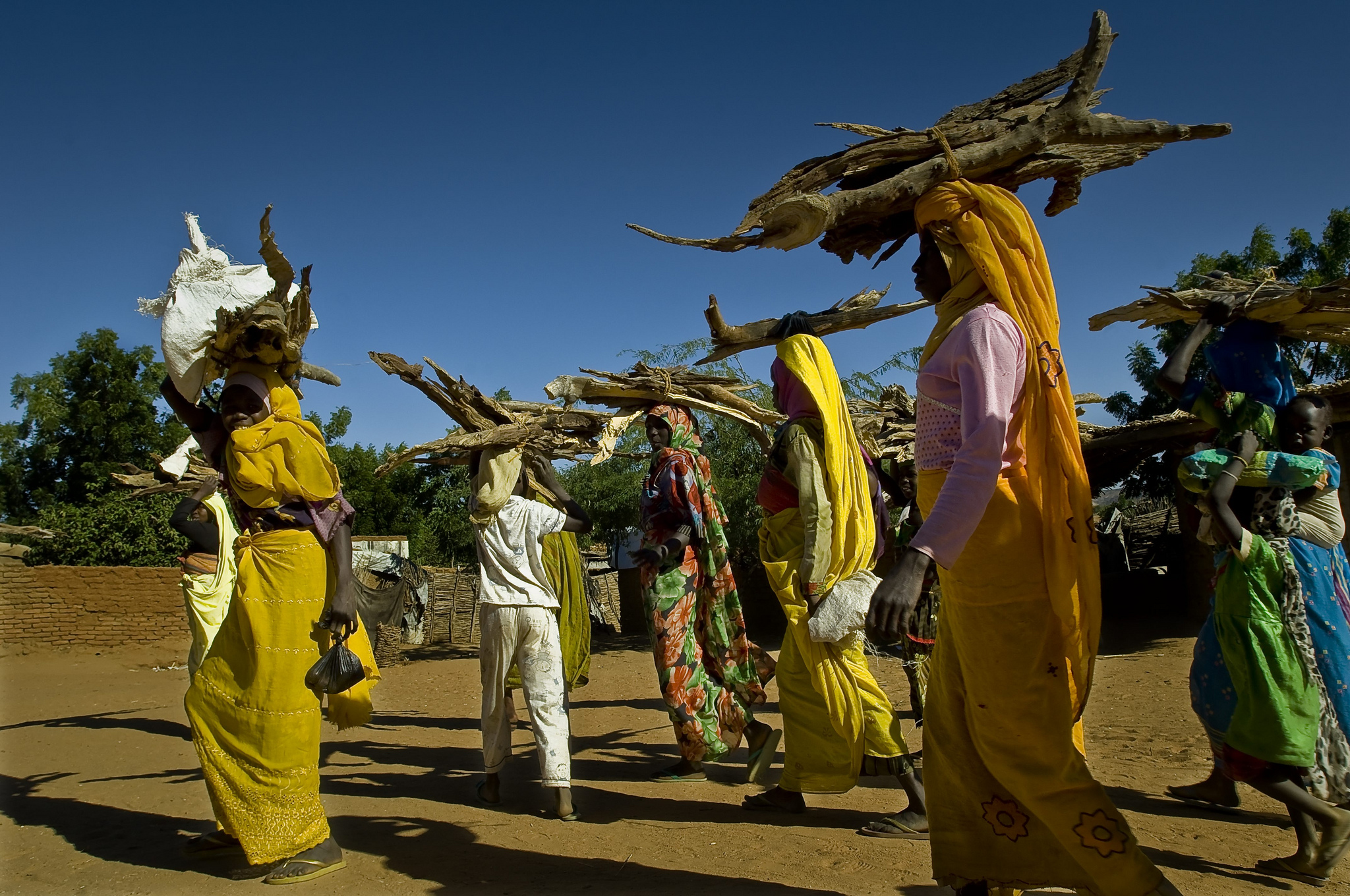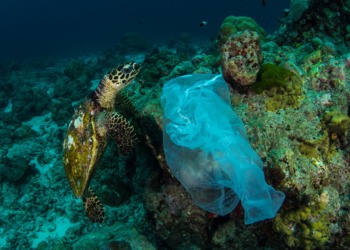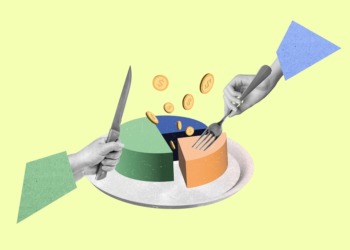Editor’s Note: This article was written by Patrick Jacqueson in collaboration with Andreas Thulstrup and Indira Joshi of the Food and Agricultural Organization of the United Nations.
Almost three billion people rely on wood, coal, charcoal or animal waste as sources of fuel for cooking and heating. The use of traditional biomass as a cooking fuel is associated with a myriad of risks and challenges. Half of the illegal removal of timber from forests is thought to be for use as fuelwood. Household air pollution attributed to cooking on traditional stoves and open fires causes over 4 million deaths per year. Furthermore, lack of access and availability of fuel for cooking is associated with additional nutrition and health risks.
In emergency settings, such as disasters induced by natural hazards and complex emergencies caused by conflict, the challenges highlighted above are often magnified. Emergency settings include protracted crises, which are characterised by “environments in which a significant proportion of the population is acutely vulnerable to death, disease and disruption of their livelihoods over a prolonged period of time” [1]. In these protracted situations, in which people have been displaced by natural hazards and conflict, women and children are often tasked with the collection of fuel wood and often spend several hours per day collecting wood in areas with degraded forests [2] .
The fuel needs of refugees and Internally Displaced People (IDPs) are often severely constrained. A major factor in this is that displacement camps are frequently established in fragile, sparsely forested ecosystems in which both host and displaced populations depend on the scarce natural resources found in areas surrounding the camps. The time spent collecting fuelwood takes time away from school attendance, income-generating activities, child care and leisure and can reduce the effectiveness of other humanitarian and development programs targeting women and children. The cross-cutting nature of the energy sector in protracted crises therefore poses a range of challenges but also a unique opportunity for building resilient livelihoods when context-specific and holistic approaches are used.
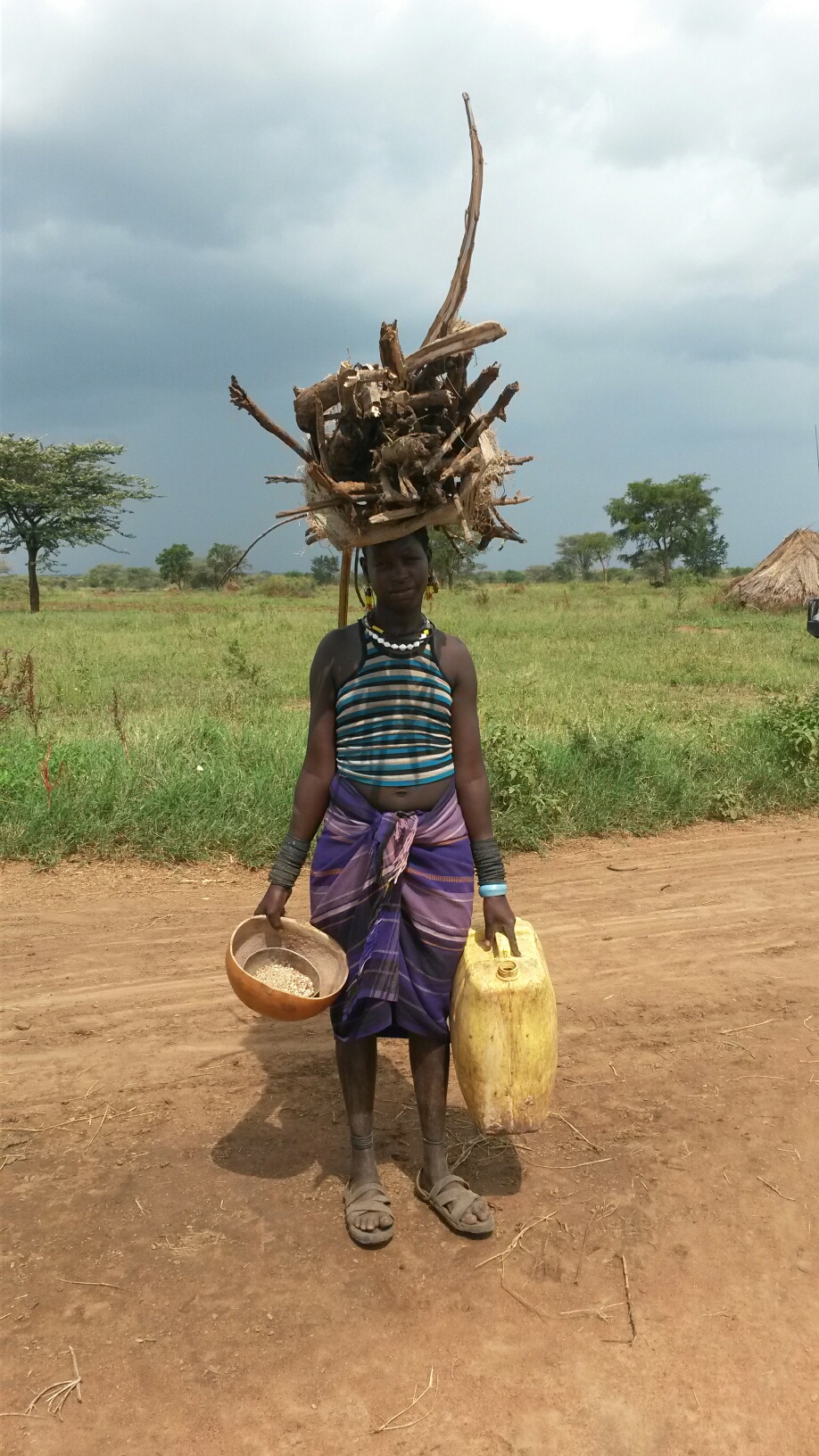
Photo Credit: F.A.O.
Energy access contributes to building resilience: The SAFE approach
Access to energy in acute emergencies, protracted crises and rehabilitation settings is strongly linked to the resilience of livelihoods. Approaches that improve access, production and use of energy can help to diversify income sources, reduce environmental impacts and improve food and nutrition security, encompassing both immediate emergency response interventions and longer-term Disaster Risk Reduction activities that help to build resilient livelihoods.
The collection, production, and use of biomass fuel, mainly firewood and charcoal, in emergencies create a myriad of risks for crisis-affected people and their environment. The same risks occur in protracted situations where displaced persons rely on biomass fuel to cook their meals as well as for lighting and heating at night. Such risks include Gender-Based Violence (GBV) or assault during firewood collection, loss of livelihood and education opportunities, environmental degradation, and respiratory illnesses caused by household air pollution.
The approaches and interventions to address these issues require greater attention, strong partnerships and a multi-sectoral approach from the humanitarian community.
Related Articles: “THE BATTLE FOR WATER” “ZERO HUNGER GENERATION-THE ROAD IS PAVED“
“HOW CLIMATE CHANGE CONTRIBUTES TO THE GLOBAL PUBLIC HEALTH CRISES”
FAO is a member of the inter-agency Safe Access to Fuel and Energy (SAFE) Steering Committee along with key partners such as WFP, UNHCR, UNICEF and the Global Alliance for Clean Cookstoves. As a member of the SAFE Steering Committee, FAO aims to contribute to a coordinated, predictable, timely, and effective response to the fuel and energy needs of crisis-affected populations. In order to design and implement effective SAFE activities, FAO harnesses its full technical, programmatic and operational expertise in partnership with relevant stakeholders.
FAO adopts a holistic and integrated approach to SAFE, addressing multiple sectors, including natural resources (including forestry and land tenure), nutrition, gender, protection, livelihoods and climate change. FAO has been using this approach in several locations (South Sudan, Kenya, Ethiopia, Somalia and Myanmar) in order to assess the multi-sectoral challenges and opportunities pertaining to the collection, production and use of fuel in acute emergencies and protracted crises.
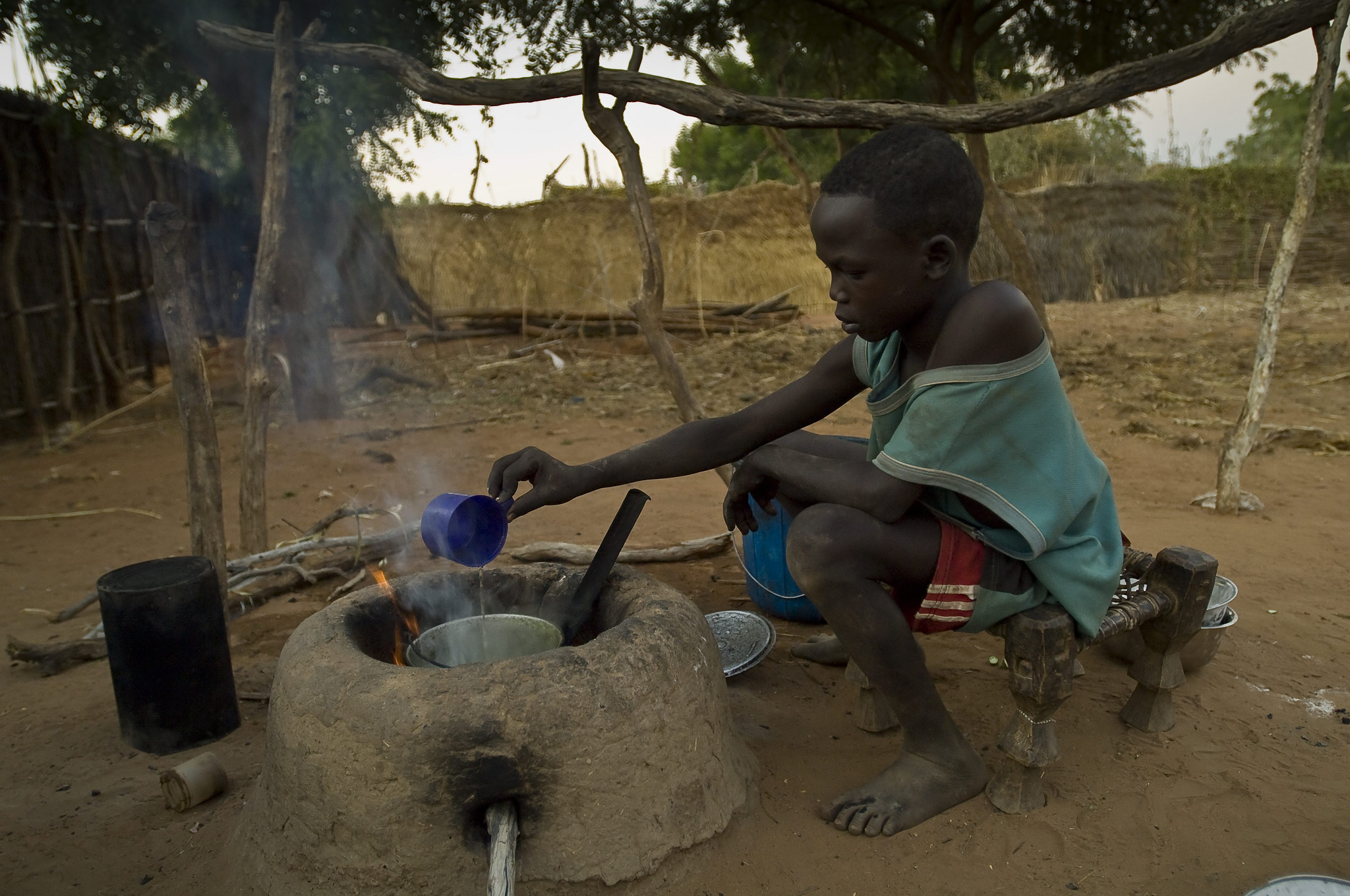 In the Photo: A young refugee cooks a meal using an improved oven that consumes less wood. Photo Credit: European Commission DG ECHO
In the Photo: A young refugee cooks a meal using an improved oven that consumes less wood. Photo Credit: European Commission DG ECHO
FAO’s approach
South Sudan: Following the outbreak of violence in South Sudan in December 2013, FAO promoted the use of fuel efficient stoves in camps as part of its emergency livelihood response programme. Approximately 40 000 durable and portable fuel-efficient stoves were procured based on specific criteria of relevance to IDPs such as durability, portability, weight of stove and the predominant fuel type used. Beneficiaries were trained on how to use and maintain the stoves as well as being trained on fuel-saving cooking practices.
90% of respondents indicated spending less time on the collection of fuelwood compared to the situation before they received fuel-efficient stoves.
This intervention was well appreciated, in particular because of its contribution to the protection of women in the context of South Sudan, where women are systematically exposed to gender-based violence when venturing outside the relative safety of IDP camps and Protection of Civilian sites to collect fuelwood. For example, a post distribution monitoring assessment conducted in Bentiu reveals that 90% of respondents indicated spending less time on the collection of fuelwood compared to the situation before they received fuel-efficient stoves and very importantly, collection trips have been reduced from 4 to 2.4 per week (on average, each collection trip took 4 hours).
Ethiopia : In 2014, FAO and UNHCR collaborated on an assessment of woodfuel demand and supply in and around two refugee camps. This assessment has provided useful information on fuel types, cooking technologies, energy needs and challenges inside the camps. The data collected has also helped to identify deficits and appropriate interventions to address fuel supply and demand management.
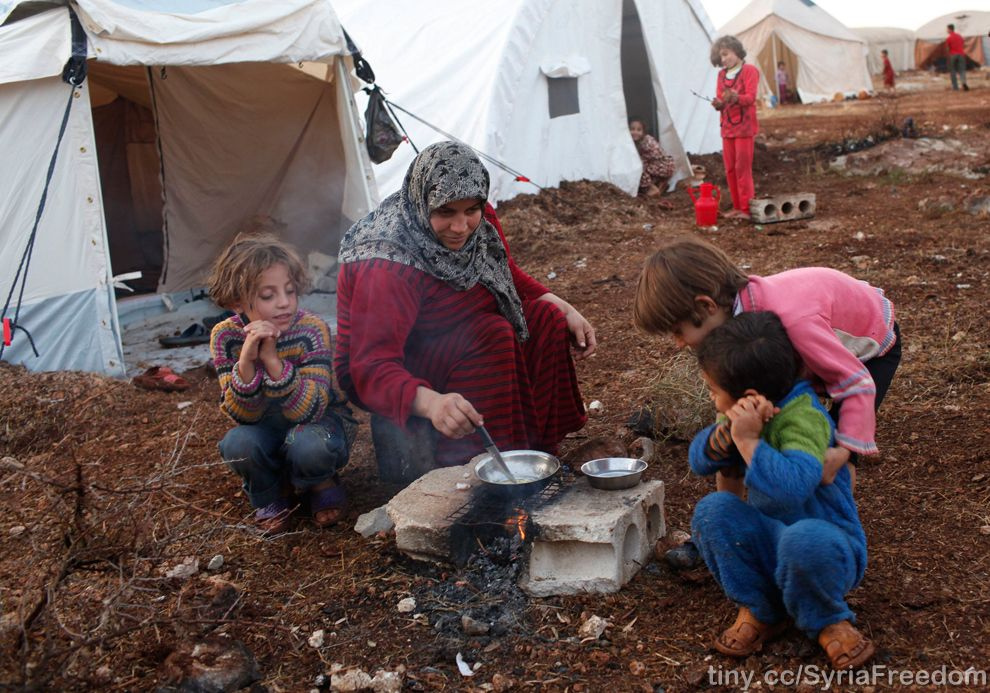
In the Photo: A woman cooks in front of her tent in a refugee camp. Photo Credit: Freedom House
Kenya: In 2015, FAO conducted a study on the fuel-related challenges faced by women in the Arid and Semi-Arid Lands (ASAL). The study focused on several contexts: refugee and host population contexts in Kakuma, Turkana County as well as rural and urban settings in Samburu County. The study is currently being expanded to cover an additional three ASAL counties after which the results will be fed into the development of an FAO SAFE strategy for the ASALs in Kenya by the end of 2015.
The strategy will complement the implementation of a SAFE project in the Kakuma refugee camp and surrounding hosting areas in Turkana County. The Kakuma camp is currently home to 170,000 refugees who have fled wars and violence in neighbouring countries.
The project is the first to benefit from a recent partnership agreement with Mastercard which will explore ways to provide credit or money to households for purchases of basic needs and farming inputs on local markets, thereby supporting local economies and putting financial tools in the hands of economically marginalized communities. In Kakuma, MasterCard will work with FAO to provide its technology expertise and a meaningful financial contribution. Camp residents will be provided with prepaid cards that will permit them to buy charcoal produced locally by the host community. The supplied charcoal has been certified as being produced in a sustainable, environmentally-friendly way. The project has been designed to improve the incomes of Turkana residents, reduce social tensions between those residents and refugees, and to relieve pressure on the environment.
Next steps
There is urgent need to continue to address the energy and fuel issues in a holistic and comprehensive manner, drawing upon the concerted efforts of FAO together with key UN agencies and other partners and stakeholders. This requires FAO’s strategic engagement with key partners such as WFP, UNHCR and UNICEF who either have standalone SAFE programs of their own or are engaging in SAFE-related activities on the ground.
FAO will also pursue partnerships with NGOs that have a strong presence in displacement contexts and protracted crises and have technical capacities to carry out fuel-related interventions. Engaging with academia and research institutions will also be a priority in the coming period.
****
Cover Photo: Refugees in Eastern Chad carrying firewood. Photo Credit: European Commission DG ECHO
Please see these resources for more information:
[1] Harmer, A. & Macrae, J. eds. (2004). Beyond the continuum: aid policy in protracted crises. HPG Report 18, p. 1. London, Overseas Development Institute.
[2] Sepp, S. (2014). Multiple-household fuel use. Deutsche Gesellschaft für Internationale Zusammenarbeit (GIZ). Bonn.


